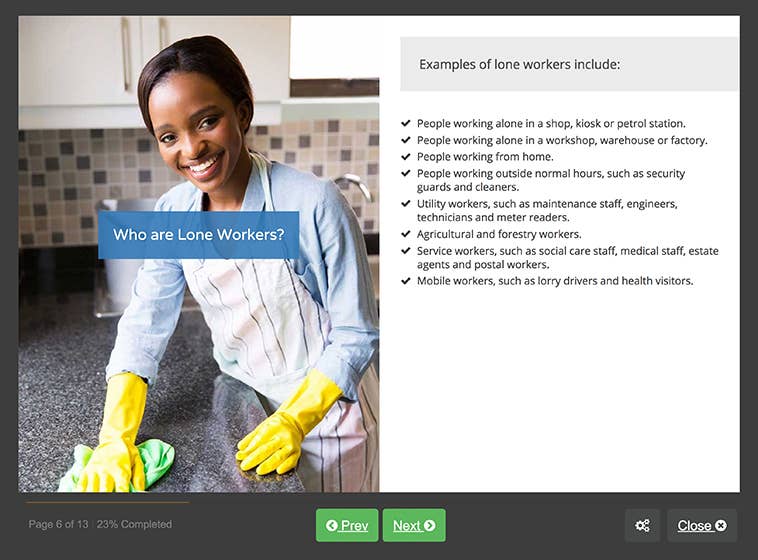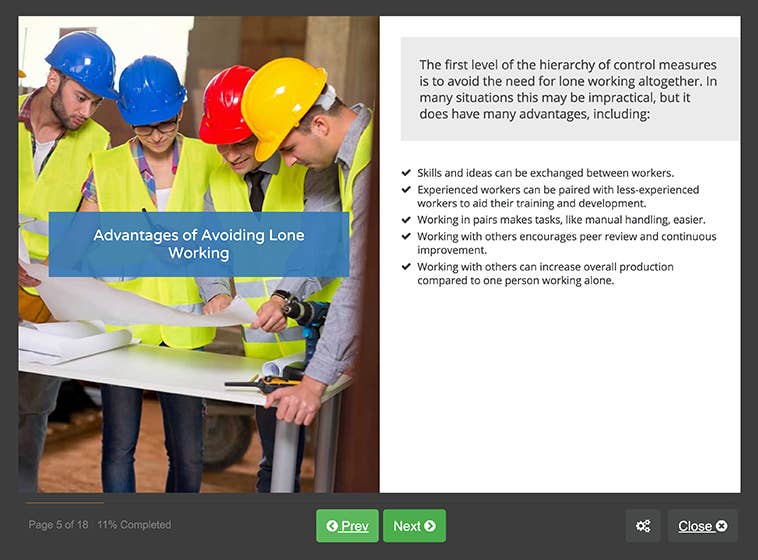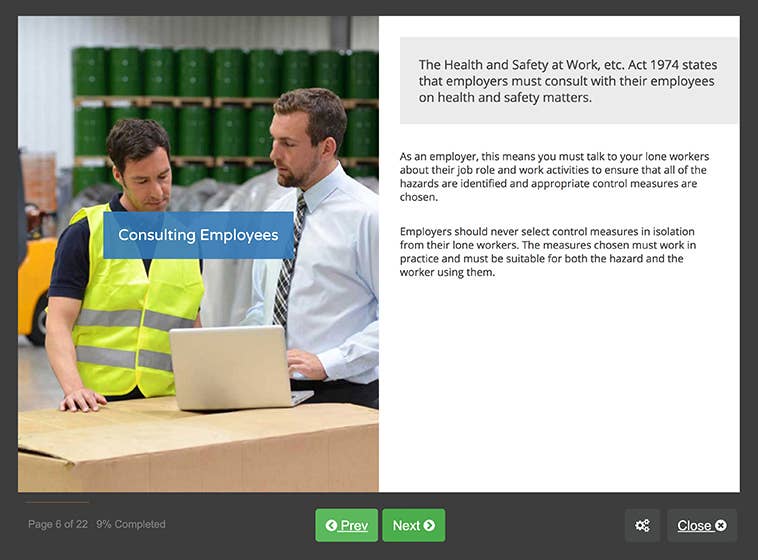Lone Worker Training
Quantity: 1

Duration 1 hour



100% online training
Start when you like
Learn on any device (desktop, mobile or tablet)
Instant assessment and result
1 learner per course
Train teams of all sizes
Bulk discounts starting at 10% off 10 courses
Pay by invoice with 30 day payment terms available (5+ courses)
Includes a 10% discount for 10+ courses
If you employ or manage someone who is required to work in isolation from others or without direct supervision, then it’s essential that the risks to their health and safety are carefully managed. Lone workers face specific risks that employees in busy workplaces are less likely to encounter so it’s important that they are identified early and effectively controlled.
This online course will provide you with a variety of practical controls that you can implement in your work environment to help keep lone workers safe from harm.
100% online training
Access anywhere
Same day digital certificate
Printed certificate posted next working day
Full audio voiceover
Assessment retakes at no extra cost
Written in compliance with UK legislation and guidance
Developed by health and safety professionals
Accredited by CPD and assured by RoSPA Qualifications
Bulk discount for orders of 10+ courses

Save on our courses when you buy more training upfront. Lock in a better price now and access the training whenever you need to. You can mix and match any of our courses too and get the discount off your whole order.
10+ courses = 10% off
50+ courses = 20% off
100+ courses = 30% off
500+ courses = 40% off
By the end of this course learners will:

Accredited by CPD
All of our courses are accredited by the CPD Certification Service as conforming to universally accepted Continuing Professional Development (CPD) guidelines.

Assured by RoSPA Qualifications
This course is also assured by the Royal Society for the Prevention of Accidents through their RoSPA Qualifications Assurance System, as providing up-to-date, quality and content-approved training.
Our in-house Learning Designers develop all of our courses to give you and your learners the most engaging training possible.








Who are lone workers?, what are the risks?, what does the law say about lone working?, employer responsibilities, and lone worker responsibilities.
What is a risk assessment?, consulting employees, identify the hazards, decide who might be harmed and how, evaluate the risks and decide on precautions, control measures for lone workers, control measures for accidents and emergencies, record your findings and implement them, and review and update.
The hierarchy of control, advantages of lone working, when lone working cannot be avoided, reducing the risks, first aid and emergency procedures, monitoring and supervision and training.
The online assessment is taken on completion of the training material. You will be asked 10 multiple choice questions with a pass mark of 80%. The answers are marked automatically so you will instantly know whether you have passed. If you don't pass don't worry! You can take the test as many times as you need with no extra charge.
This course has been designed to help people who employ, manage or supervise lone workers to understand the risks posed by lone working so that they can implement an effective safe system of work.
The course would also be beneficial for lone workers themselves who wish to learn more about the regulations, risk assessments and appropriate lone working control measures.

In partnership with
Neil Murray
Health and Safety Consultant
Neil Murray is a vastly experienced and highly qualified health and safety professional who has held roles such as Senior Health and Safety Executive inspector, and Principal Inspector for Channel Tunnel construction. He has also held senior roles in an international infrastructure business, a major UK water utility company and a major construction group and provided management consultancy to numerous companies across a wide range of industries.
Neil has a wide expertise in many sectors, including construction, civil engineering, manufacturing engineering, water and waste utilities, education, heritage sites, public safety, rail construction and operation, transport, marine, waste management, engineering design and industrial and facilities management services.
Neil is a QSA auditor for RoSPA and also an author of published guidance on health and safety in the construction of the Channel Tunnel, work at height, major project management, and online training courses.